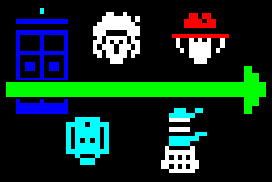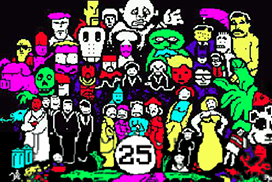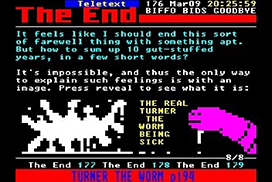
Grumble feature enabled

|
No harm, no foul
Edge #170, Christmas 2006
Mainstream popular culture has always had a somewhat rubbish relationship with videogames. Working in TV, it's always a risk putting anything to do with games into a script, because nine times out of ten it comes out looking a bit 'Disco Vicar'.
I recently wrote a scene featuring videogames into a show I was working on. It was a fairly throwaway little moment; a father and son sitting in front of a TV, playing a game.
I originally had a line in there about cheating with 'infinite health', and got asked to change it to 'infinite lives'. I tried to explain that these days health is a lot more common in games than infinite lives, and they should be glad I hadn't referred to Hot Coffee. I lost the debate.
Worse than this, on the night it came to be filmed, the actors were sitting there holding massive, flight simulator-style joysticks. Upon seeing them, I immediately shrieked in horror, and stamped my foot no fewer than ten times until someone was dispatched to acquire some more contemporary hardware. Even then they returned, inexplicably, with one Xbox joypad and one PS2 joypad, and the noises they used were straight out of an '80s arcade - lots of tinny sound effects, and Bontempi organ music.
Clearly, games still have a long way to go before they can escape the stereotype that got hardwired into the public consciousness in about 1992. It's like when you see a fake rock band in a children's TV show - they always look like Mötley Crüe, despite the fact no rock band (including Mötley Crüe, probably) has looked like Mötley Crüe since 1985; all day-glo poodle wigs and Billy Idol sneers.
Similarly, the stereotype still persists that videogames will rot your brain; that they're all violent, and will stunt the development of your child. I know people who wouldn't dream of having a PS2 in their house in case it tried to possess their offspring, or turned them into Charles Manson.
My other half and I try to limit the amount of games our kids play, but I'm no longer convinced that games are as harmful as I once thought they were (or had the potential to be, anyway). We used to worry about the amount of time our kids spent playing games, and feared that it would stunt their social skills.
Certainly, I'm a loose supporter of the argument that violent videogames could well desensitise you to violence. I mean, if all you do with your life is play violent games where you get to burn out people's eyes and grind faces with industrial tools, of course it's going to have an effect. Albeit only in the same way that you'll start dreaming about biscuits if all you ever do is eat biscuits, and play with biscuits, and live in a house made out of biscuits, and all your friends are imaginary biscuit people.
At the same time, I fully appreciate the argument that if you're the sort of person who is likely to go on a violent rampage, you're as likely to be inspired by a sack of biscuits as you are a violent videogame.
Certainly, I think back to how much I played games as a kid - before the tabloids started banging their drum about how they'll rot your soul - and it took up a hefty proportion of my teenage life. Oh, I also used to like drawing, and riding my bike, and throwing rocks at pensioners. And I used to go and see friends (usually to play games). But there's no doubt that I loved games, and I played them a lot, and I don't think it's done me a great deal of harm. Quite the opposite: I think games fuelled my imagination.
Therefore, I'm not convinced games have harmed my kids. They play games with their friends - Mario Party, and Lego Star Wars, and Wario Ware - and they're far from sitting there playing them in silence. And they tend not to play shoot 'em ups, favouring the likes of Zoo Tycoon, or The Sims, or Harvest Moon - all of which are far from harmful. In fact, I'd argue that they're borderline proper educational, and are equipping them with skills that could come in useful in their adult life.
I'd much rather my kids sat down and played on Rollercoaster Tycoon for 90 minutes, or designed graphics in Animal Crossing, than watched the vacuous tripe that is The Cheetah Girls movie. Or three episodes of The Suite Life with Zack and Cody. Or hours spent chatting to paedophiles on MSN. Crikey, even Call Of Duty 2 contains an infinite amount more intellectual stimulus than the average episode of Naruto.
What doesn't help is that the really big-name games - the ones that grab the shock headlines - are of the big tits/big guns/school bully variety.
Isn't it about time that the industry united in trying to change perceptions of games? We need a concerted PR campaign to promote the more positive aspects of gaming, and once and for all dispel the media's warped perception of what games are, and what they can be.
If for no other reason than to convince Mrs Biffo that staying up until 4am playing Company Of Heroes isn't an utter waste of my life. Or maybe I'll just give her a good punching.
Mr Biffo co-founded Digitiser, Channel 4's Teletext-based videogames section, and now writes mainly for television
Do you know of any important moments from the annals of Digi history that have been omitted? If so, then mail me (superpage58@gmail.com) right now, man. Credit will be duly given for anything that gets put up.









